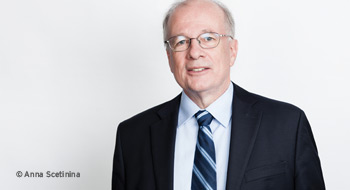

When Claude Lamoureux first started at the Ontario Teachers’ Pension Plan in 1990, the organization had just hired Mercer’s Malcolm Hamilton to be the board’s actuary. “The first week I was there, he was scheduled to give an introductory talk. I thought I would get caught up on my reading during this boring actuary’s presentation,” he recalls. “After the first few minutes, I thought, Wow, this guy isn’t a traditional consultant. We’re going to have a lot of fun together.”
Since the early days of his career, Hamilton—this year’s recipient of Benefits Canada’s Lifetime Achievement Award in the Pension & Investment category—has built a reputation as a fiercely independent thinker on pension issues and a highly compelling speaker. Never content with someone else’s answer to a problem, he prefers to work it out himself and come to his own conclusions. “I tend to focus on the things that are wrong,” says Hamilton, who has worked at Mercer for more than 30 years. “If there’s something that is widely believed to be true but doesn’t add up, I’ll try to figure out why.”
Hamilton is apt to question conventional wisdom, and his commitment to pension issues has made him a tireless advocate for rethinking the funding and design of pension plans to improve their sustain-ability and accessibility for all Canadians.
In the 1990s, he chaired a Canadian Institute of Actuaries task force that wrote a seminal report called Troubled Tomorrows. That paper influenced a change in government policy, which led to a reduction in government debt and increased funding of the Canada/Quebec Pension Plan. Over the next decade, Hamilton gave speeches urging plan sponsors to abandon DB plans and advocating for a 50% to 60% income replacement ratio—not the traditional 70%.
“I had never heard a convincing argument for the 70%. The ‘people’ in my spreadsheets needed about 50%. The supporting evidence was everywhere. For example, public servants usually retire early with 55% or 60% replacement. But the system just rumbled on as if 70% was the right answer,” he says.
The power of Hamilton isn’t solely based on his intellect, it’s also on his ability to walk others—especially those in disagree-ment—through his reasoning with clarity and humour, says John Ilkiw, who worked with Hamilton at Mercer and later became a close friend. Ilkiw recalls attending a presentation from the CFA (Chartered Financial Analyst) Institute where a speaker explained all the pieces of the pension puzzle in Canada. “Then Malcolm got up and said, “You described all the pieces, but all the pieces don’t fit.” And he started to explain how the system wasn’t functioning right, without any notes, says Ilkiw. “He can prick the pomposity of a lot of people who like to make pensions more complicated. It’s a good thing.”
Fred Vettese, chief actuary with Morneau Shepell, worked with Hamilton in the 1980s at Mercer and believes he’s the most articulate, entertaining speaker and writer in the business. “There has never been an actuary in the pension industry quite like Malcolm. His piercing insights and unflinching pronouncements—uncoloured by any self-interest—have made a major contribution to the actuarial profession and to the industry at large. He is never afraid to be controversial, and his views are always backed by solid and original research that cuts through conven- tional wisdom like a machete,” he says.
Ilkiw says Hamilton is one of a small group of pension actuaries from rival firms that strive to better understand how pension assets and liabilities work just for the sake of it. “The intention is to contribute to the community so everyone learns more,” he says. Hamilton uses this insight to help colleagues, plan sponsors and lay people unpack and improve their own thinking about pensions, says Lamoureux, now retired from Teachers’. “He often pushed me. He would demonstrate that my thinking wasn’t always that refined,” he says.
One of the ways Hamilton has kept a contrarian perspective is by looking at the challenges of the pension system from the perspective of working Canadians. “A lot of my time in the past 15 years has been spent trying to see things from the users’ (i.e., employees’) perspective,” he says. Today, this fuels his attempts to promote a better understanding of how the retirement system can help Canadians with below-average incomes. “They don’t have a lot of spare money to save, and they can ill-afford to waste it on bad choices.”
With his retirement set for the end of 2012, this challenge may be a topic Hamilton will spend more time writing about, but he won’t confirm that now. “When I retire, if I write some papers, I’ll probably write one on the problems with public sector pension plans,” he says. Ilkiw and Lamoureux don’t think he’ll be able to stop at one. “He’s really a researcher and an academic,” says Lamoureux. And the pension industry still needs his honest, constructive and iconoclastic approach.
Leigh Doyle is a freelance writer based in Toronto. leigh.doyle@gmail.com
